- Home
- John Kendrick Bangs
Annals of the Poor Page 19
Annals of the Poor Read online
Page 19
A VISIT TO THE INFIRMARY.
I went a few months since to visit a parishioner, then in the countyinfirmary, within some miles of which I reside, and was informed that inan adjoining ward there lay a very good old man, confined by amortification in his foot, who would take particular satisfaction in anyChristian conversation which my time would allow me to afford him.
The nurse conducted me into a room where I found him alone on a bed. Thecharacter of his countenance was venerable, cheerful, contented, andpious. His hoary hairs proclaimed him to be aged, although theliveliness in his eye was equal to that of the most vigorous youth.
"How are you, my friend?" I said.
"Very well, sir, very well. Never better in all my life. Thank God forall his mercies!" replied the man, with so cheerful a tone of voice as atonce surprised and delighted me.
"Very well! How so? I thought from what I heard you were in much painand weakness," said I.
"Yes, sir, that is true; but I am very well for all that. For God is sogood to my soul, and he provides everything needful for my body. Thepeople in the house are very kind; and friends come to see me, and talkand pray with me. Sir, I want nothing but more grace to praise the Lordfor all his goodness."
"Why, my friend, you are an old pilgrim, and I am glad to see that youhave learned thankfulness as you travel through the wilderness."
"Thankfulness!" quickly returned he. "No, sir; I never did thank theLord, I never could thank him; no, nor I never shall thank him as Iought, till I get to glory. And then--oh, then--how I will thank him forwhat he has done for me!" Tears of affection filled his eyes as hespoke.
"What a good Master you serve!" I added.
"Ay, sir, if the servant was but as good as the Master. But here I am, apoor old sinner, deserving nothing, and receiving everything which Ineed. Sir, I want nothing but more grace to serve him better. I liehere on this bed, and pray and sing by night and day. Sir, you must letme sing you my hymn; I always begin it about four o'clock in the morning,and it keeps my spirits alive all the day through."
Without waiting for my reply, he raised himself up, and in an aged andbroken, but very affecting tone of voice, he sang two or three verses,expressive of God's goodness to him, and his own desire to live to God'sglory. The simplicity, serenity, and heartfelt consolation, with whichthis venerable disciple went through it, gave a colouring to the whole,and left an impression on my mind which it would be impossible to conveyto the reader.
As soon as he had finished his hymn, he said, "Do not be offended, sir,at my boldness: you love the Lord, too, I hope; and then I am sure youwon't be angry to hear me praise him. But now, sir, talk to me aboutJesus Christ. You are his minister, and he has sent you here to-day tosee a poor unworthy soul, that does not deserve the least of his mercies.Talk to me, sir, if you please about Jesus Christ."
"Neither you nor I are able to talk of him as we ought," I answered; "andyet, if we were to hold our peace, the very stones would cry out."
"Ay, and well they might, sir, cry shame, shame upon us, if we refused tospeak of his goodness," said the old man.
"Jesus Christ," I continued, "is a sure refuge, and a present help intime of trouble."
"That's right, sir; so he is."
"Jesus Christ has taken care of you, and watched over you all the days ofyour life; and he will be your guide and portion in death."
"That's right again, sir; so he will."
"You have committed your soul into his keeping long since, have you not?"
"About forty years ago, sir; about forty years ago, (when I first used tohear Mr. Venn and Mr. Berridge,) he came to seek and to save me, a vilesinner, who deserved nothing but his wrath. I can never praise himenough."
"Well, my friend, and this very Saviour, Jesus Christ, whom you love, andin whom you trust, lived for you, and died for you; he rose again foryou, and has sanctified you by his Holy Spirit, and now lives to makedaily intercession for you: and having done all this, do you think hewill leave you to perish at last?"
"No, sir," said the old man: "faithful is he that hath promised, and willdo it. Mine, alack, is a changing heart; but he changeth not. I believethat he hath laid up a crown of glory for me; and though the old enemy ofsouls sometimes tells me I shan't have it, I believe in Christ soonerthan in him, and I trust I shall have it at last."
"And do you not find by experience," I added, "that his yoke is easy, andhis burden light? His commandments are not grievous, are they?"
"No, sir, no: it is a man's meat and drink, if he loves the Lord, to dowhat he bids him."
"Where were you before you came into this infirmary?"
"In the parish workhouse of S---."
"Have you a wife?"
"She died some years since, and got to her heavenly home before me."
"Have you any children?"
"Yes, sir, I have two sons married, and settled in the world withfamilies. One of them has been here to see me lately, and I hope he isin a good way for his own soul, and brings up his children in the fear ofGod."
"Have you any worldly cares upon your mind?"
"_Not one_, sir. I am come to this house, I plainly see, to end my days;for this mortification in my leg must, before it be very long, bring meto the grave. And I am quite willing, sir, to go, or to wait the Lord'sown time. I want nothing, sir, but more grace to praise him." Whichlast words he often repeated in the course of the conversation.
"You have reason," I said, "to feel thankful that there is such a houseas this for poor and sick people to be brought to, for both food,lodging, and medicine."
"That I have, indeed, sir; it is a house of mercies to me, and I amashamed to hear how unthankful many of the patients seem to be for thebenefits which the Lord provides for them here. But, poor creatures,they neither know nor love him. The Lord have mercy upon them, and showthem the right way. I should never have known that good way, sir, if hehad not taken compassion upon me, when I had none upon myself."
Tears ran down his aged cheeks as he spoke these last words. "Here,"thought I, "is a poor man that is very rich, and a weak man that is verystrong." At this moment the nurse brought in his dinner. "There, sir,you see, more and more mercies! The Lord takes care of me, and sends meplenty of food for this poor, old worn-out body."
"And yet," said I, "that poor old worn-out body will one day be renewedand become a glorified body, and live along with your soul in thepresence of God for ever."
"That's right, sir," said the good old man, "so it will: 'though after myskin worms destroy this body, yet in my flesh shall I see God.' But,come, sir," seeing me look at my watch, "you must speak a word _to_ yourMaster, if you please, as well as _for_ him. I will put down my dinnerwhile you pray with me."
I did so, the man often adding his confirmation of what I offered up byvoice, gesture, and countenance, in a manner highly expressive of theagreement of his heart with the language of the prayer.
Having ended, he said, "God be with you, sir, and bless your labours tomany poor souls! I hope you will come to see me again, if my life bespared. I am so glad to see those who will talk to me about JesusChrist, and his precious salvation."
I replied, "May the God of Abraham, Isaac, and Jacob, who carried themthrough the days of their pilgrimage, and brought them safe to a citywhich hath foundations, bring you there too, and bless you all theremaining days of your journey till you get home! I am going to seeseveral serious friends this evening, who would be glad, I know, toreceive a message from one who has had so much experience of a Saviour'smercies. What shall I say to them?"
"Tell them, sir, with my Christian love and respects, that you have beento see a poor dying old man, who wants nothing at all in this world butmore grace to praise the Lord with."
So ended our first interview. I could not help reflecting, as I returnedhomewards, that, as the object of my journey to the infirmary had been tocarry instruction and consolation myself to the poor and the sick; so thepoor and the sick
were made instrumental to the conveying of bothinstruction and consolation to my own heart in a very superior degree.
I saw him four or five times afterwards, and always found him in the samehappy, patient, thankful, and edifying state of mind and conversation.The last time I was with him, he said, "Sir, I long to be at my heavenlyhome, but I am willing to remain a traveller as long as my Lord andMaster sees good."
He died {203} not long after my last sight of him, in the steadfastassurance of faith, and with a full hope of immortality.
Footnotes:
{87} The mother died not long after her daughter; and I have good reasonto believe that God was merciful to her, and took her to himself.
An interesting account of a visit recently made to the Dairyman's cottageappeared in the _Christian Guardian_ for October 1813. A still morerecent visit to the good old Dairyman (who still lives, at the age ofeighty-two) has been made by the author of this narrative. (_June_ 1814)
The good old Dairyman died in 1816. His end was eminently Christian.
{97} "Now abideth faith, hope, charity, these three; but the greatest ofthese is charity" (1 Cor. xiii. 13)
{98} This circumstance took place before the late abolition of the slavetrade.
{103} The day has since arrived, when the persevering efforts of Mr.Wilberforce to accomplish this happy purpose have been fully answered._The slave trade is abolished_! The Church of God rejoices at thistriumph of the cause of Christ over the powers of darkness.
{105} In the course of conversation, he sometimes addressed me with theword "Massa," for "Master," according to the well known habit of theNegro slaves in the West Indies; and sometimes 'Sir,' as he was taughtsince his arrival in England; but the former word seemed to be mostfamiliar to him.
{107} A kind of shell-fish, which abound in the place where we were, andwhich stick to the rocks with exceeding great force.
{121} Song of Solomon i. 5.
{203} The foregoing conversation took place on September 22, 1808, andis faithfully related.
J--- S---, the good old man, died in the Infirmary, in December 1808.

 The Genial Idiot: His Views and Reviews
The Genial Idiot: His Views and Reviews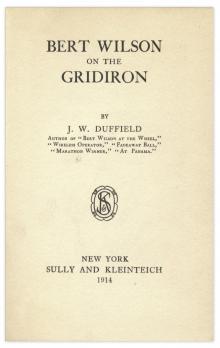 Bert Wilson, Marathon Winner
Bert Wilson, Marathon Winner The Enchanted Typewriter
The Enchanted Typewriter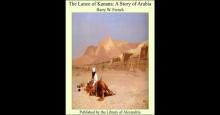 The Lance of Kanana: A Story of Arabia
The Lance of Kanana: A Story of Arabia Coffee and Repartee
Coffee and Repartee The Idiot at Home
The Idiot at Home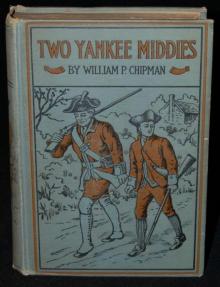 Budd Boyd's Triumph; or, The Boy-Firm of Fox Island
Budd Boyd's Triumph; or, The Boy-Firm of Fox Island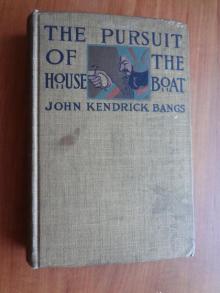 The Pursuit of the House-Boat
The Pursuit of the House-Boat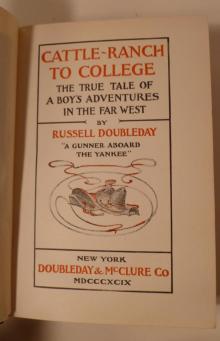 Cattle-Ranch to College
Cattle-Ranch to College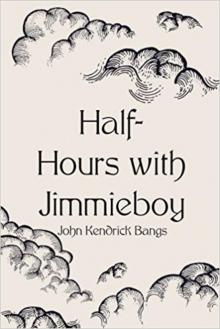 Half-Hours with Jimmieboy
Half-Hours with Jimmieboy Bikey the Skicycle and Other Tales of Jimmieboy
Bikey the Skicycle and Other Tales of Jimmieboy Toppleton's Client; Or, A Spirit in Exile
Toppleton's Client; Or, A Spirit in Exile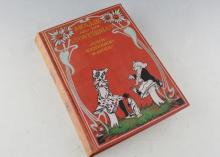 Mollie and the Unwiseman
Mollie and the Unwiseman The Inventions of the Idiot
The Inventions of the Idiot Andy the Acrobat
Andy the Acrobat In Camp With A Tin Soldier
In Camp With A Tin Soldier Angel over the Right Shoulder
Angel over the Right Shoulder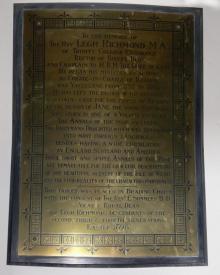 Annals of the Poor
Annals of the Poor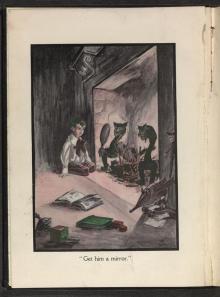 Andiron Tales
Andiron Tales Andy at Yale
Andy at Yale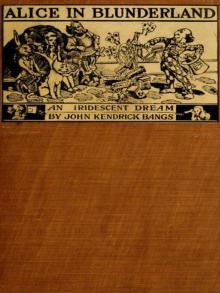 Alice In Blunderland
Alice In Blunderland